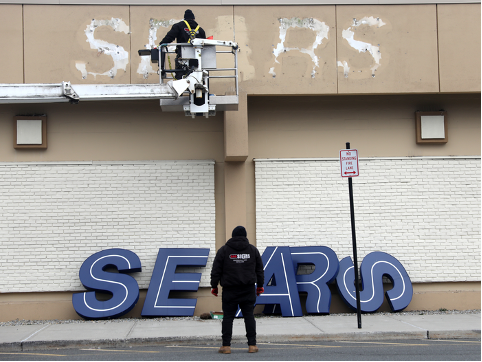Attentiveness: Sears and Starbucks

When I was in high school, I remember my mom picking up a reproduction of one of the first Sears and Roebuck catalogs. It was a marvel to behold. You could order anything from farm equipment to socks, from rolling pins to earrings; watches, eyeglasses, shirts, and underwear — most anything you could imagine shopping for, you could find in the catalog– back in the 1890s! It was a great innovation in marketing. It was the Amazon of the 1890s.

That was 135 years ago. Today, Sears is (for all intents and purposes), dead.[1] We pass the huge empty Sears store every time we go to Logan International Airport. To me it serves as both an icon of human institutions and also of our fallen world. Businesses are human institutions that are temporary, no matter how big and impressive our companies—even large and powerful international businesses—they all will die. [2] Amazon will die. Starbucks will die. The British East India Company (BEIC) was one of the largest international companies in the world. It is gone. The Dutch East Company no longer exists.
Not so the Church of Jesus Christ. The Church has outlasted all companies, large or small, and the church has had the greatest impact of any institution in the world on human history. Many smaller churches may seem weak and ineffective, but don’t be deceived by appearances. Governments, leaders, and rulers throughout the world have feared the Church and often have attempted to control or annihilate her.
Sitting at the airport the other morning I was overwhelmed pondering the business model of Starbucks. People will wait 20 minutes for a cup of “coffee,” having chosen from a plethora of varieties that didn’t exist 20 years ago. Starbucks has helped to create appetites that have been artificially cultivated and now Starbucks outlets are ubiquitous in airports and most cities worldwide. They seem hyper-relevant to our lives. Last spring Nancy and I found a Starbucks within walking distance of our hotel in Taipei. We even bought a Starbucks Taipei coffee mug.
There is a temptation in Western culture to desire that the church or a seminary possess greater relevancy and be more attractive, that is, more like Starbucks. Don’t we want Jesus to be more attractive and relevant than He seems today? In the West today, the church seems outdated, past its prime, and irrelevant to cultural trends.
So, my mind has wandered to relevance, human needs, Truth (yes with a capital T) and contextualization. The church is not Starbucks, nor is it the BEIC. As much as I wish we were more “popular” or as much as I wish churches were growing and seminaries were healthy, I remind myself that Gordon-Conwell’s vision for the seminary is a good corrective when the sirens of relevance or popularity are seductively singing.
Our vision is rooted in the truth of the creation, fall, redemption, and eternity. God’s future, our heavenly existence, is replete with all the peoples of the earth, focused on the redemption found in Jesus’ sacrifice with the result that all tears will be wiped away: “Many Languages, One Lamb, No Tears” is our vision statement (Revelation 7:9-17).
There are times such a vision may seem hard to “market,” or it may seem too limited for our post-Christian world. This vision is exclusive and for many in our world this is the height of effrontery postmodern sensitivities. But we must remember at the same time this vision is all inclusive. It is exclusively about Jesus Christ as the only redeemer and therefore it is inclusive of all people. Thus, it is a vision that includes all. The exclusive Christ includes all peoples. All the fallen and broken rebels are welcome to receive grace and be given a new heart.
We are compelled to proclaim, enact, and welcome all people around this vision in ways that are winsome, true, and pure. However, this may still mean that we are not as popular as Starbucks. Preaching the truth of Jesus will ensure that we never go the way of the now-defunct Sears, either.
[1] More accurately, Sears avoided bankruptcy, but now has only 17 stores left.
[2] After I wrote this sentence I did a little research. As a general rule this is correct, but some family companies have broken the rule. Five companies in Japan have lasted for over 1,250 years! https://www.worldatlas.com/articles/the-oldest-companies-still-operating-today.html#:~:text=Kongo%20Gumi%2C%20established%20in%20578,the%20Shitenn%C5%8D%2Dji%20Buddhist%20temple.
 Dr. Scott W. Sunquist, President of Gordon-Conwell Theological Seminary, is author of the “Attentiveness” blog. He welcomes comments, responses, and good ideas.
Dr. Scott W. Sunquist, President of Gordon-Conwell Theological Seminary, is author of the “Attentiveness” blog. He welcomes comments, responses, and good ideas.